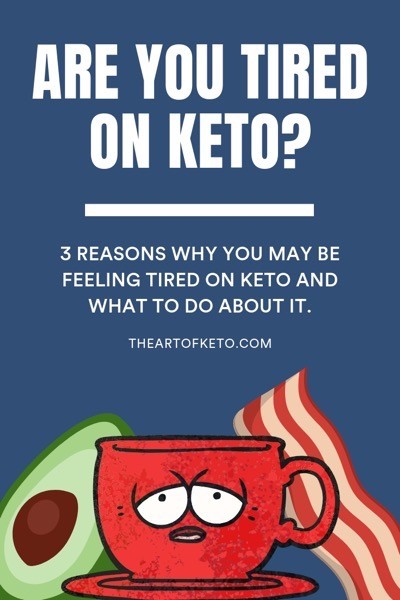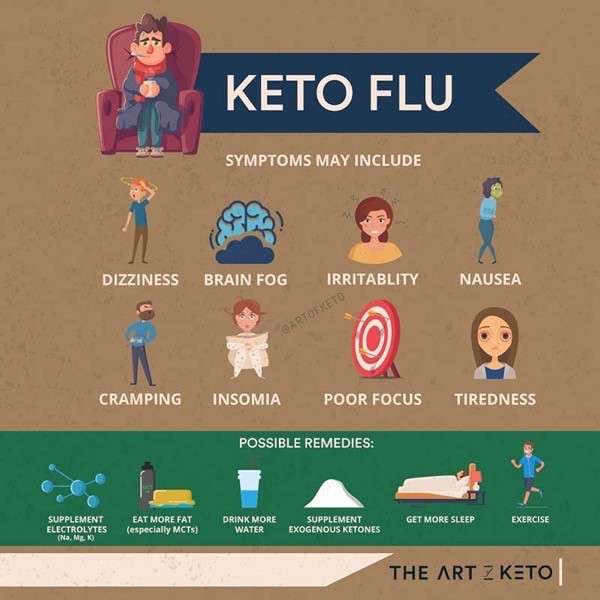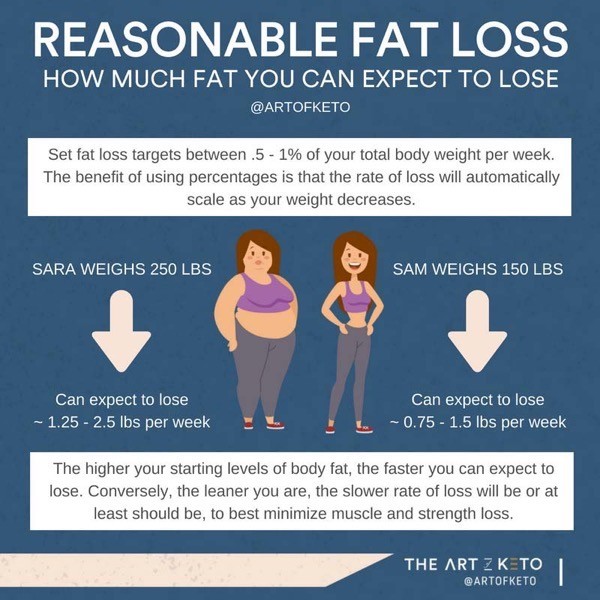You might have seen success stories or heard from a friend how amazing they feel on a ketogenic diet. And they weren’t lying. However, there's a point where many are simply feeling tired and exhausted following the keto diet, so what gives?
People find themselves tired and exhausted on a keto diet due to a few reasons. The main reasons people experience low energy on keto are a lack of electrolytes (mainly sodium), which leads to the keto flu, eating too few calories, and not being adapted to using fat for fuel yet.
One of the reasons I love a ketogenic lifestyle is that I feel great.
- Steady energy
- Clear focus
- No dips or crashes
- Appetite suppression
So now you’re wondering why YOU are tired and exhausted on the keto diet, and it usually boils down to a few key reasons I will be outlining below and tips to resolve it.

Why You're So Tired, Hungry, And Exhausted On Keto, But First…
Look, I get it… you’re tired and hungry.
While you should expect at least some tiredness or hunger during a fat loss diet, you shouldn’t have to slog throughout the day or daydream about food every waking second.
Unless you’ve dieted down to ultra-low levels of body fat like a bodybuilder that is.
The truth is, if you give it enough time and fix what I’ll cover below you should feel satiated and have plenty of energy.
Burning fat for fuel
Your body can only store upwards of about 2,000 calories of carbohydrates. Compare THAT to even a lean individual who carries at least 30,000 calories of fat available for energy.
Compared to a carbohydrate-based diet, you are teaching your body to use this fat (both from your food AND your love handles) for fuel while on keto or low carb.
Steady energy levels
You should have steady energy levels on a keto diet because there are no sugar spikes and dips on a ketogenic diet compared to your Standard American Diet (SAD).
If your body needs fuel on , it can easily convert stored body fat (the fat on your body) into ketones and provide that energy.
Compare that to a carb diet… once you’re out of energy, you will have to eat some more carbs to bring yourself back to life.
Talk about being hangry.
Increased Satiety
Keto is appetite suppressing by nature.
A diet high in healthy fats helps delay gastric emptying (basically helps slow digestion of food).
This slowing helps you stay full longer.
Ketones themselves might also promote feelings of satiety, but through what mechanism exactly is still unknown.
Why You're So Tired On A Keto Diet
So let’s get down to it.
Why aren’t you experiencing all this energy you’re supposed to have?
Keto flu
The dreaded “keto flu” is just how it sounds.
You literally feel like you’ve come down with the flu and have no idea what’s going on. Almost everyone suffers a little bit from the keto flu, so you're not alone.
… even during the blazing summer months.

When does keto flu start?
You may notice flu like symptoms within 2-3 days after starting a ketogenic diet.
Keto flu symptoms
Keto flu symptoms include:
- Fatigue
- Irritability
- Headache
- Nausea
- Dizziness
- Brain fog
How long does keto flu last?
The symptoms of keto flu last anywhere from 1 to 3 weeks, but we can generally avoid or shorten that with the tips below.
Keto flu quick tips
A few tips to help minimize or erase the keto flu symptoms you may be experiencing.
Salt everything
Liberally salt ALL of your foods. Salt isn’t the devil here, and may even be more important to be mindful of while on keto. Many of the keto flu symptoms result from an electrolyte imbalance caused by the diuretic nature of a ketogenic diet, this includes sodium, magnesium, and potassium.
If you've noticed that you had to urinate more frequently lately, that's why. The same applies to anyone who's greatly reduced their carb intake.
A good read on salt is the book The Salt Fix.
Salts I recommend using due to increased mineral content (and they taste better), but really any salt will do:
Keep your fats and calories high
When switching to a ketogenic diet, people naturally start to eat even less (which is a good thing).
The problem here is that dieting is a stress that your body doesn’t want. Compound this with making your body switch from burning carbs to burning fat for fuel, and that can be a recipe for disaster.
Keep your calories up, at least in the beginning (1-3 weeks), before dropping them back down for further fat loss.
Keto diet is too low in calories
To expand on the above point, your rate of weight loss is too high.
This is the part where you need to exercise patience and not fall for what you’re seeing on social media or expecting results like Bobby or Sally.
You do you.
I always recommend a weight loss of 0.5% – 1.5% per week. The more fat you have to lose the higher you can generally go, but when you’re down to the last few pounds, you should expect to lose slower as to minimize any muscle loss.
For a 200 pound individual aiming for 1% of weight loss per week, that would translate to a 2 pounds per week weight loss MAX.
Sometimes you didn't even mean to eat so little; the keto diet or a low carb diet can often significantly reduce or eliminate hunger for people, one of the many welcomed side effects.

Keto-adaptation period
Regardless of what you do, the body AND the brain have to go through an adaptation period.
This period is usually referred to as keto-adaptation or fat-adaptation.
Again, this period will last between 1 to 3 weeks for most individuals regardless of whatever preventive measures you may take.
However, some people may feel fine, and some may feel low in energy during this time. The best thing you can do is follow the above tips and remain patient.
5 More Tips If You're Still Fatigued On Keto
If you've addressed the above issues and still experiencing fatigue on the keto diet, here are a few more tips to help boost your energy.
Eat More Frequently
If your body is processing higher fat macros just fine, then another reason to eat more frequently is for the sake of digestion. Some people find that larger meals don't sit well and are hard for the body to process.
Smaller, more frequent meals may be easier for you to digest. This will have you feel less sluggish and a lot lighter than larger, but less frequent, meals (much like those who practice intermittent fasting).
Also, if you're someone who generally suffers from heartburn or acid reflux, you may benefit from a supplement like Betaine HCL. You may lack enough acid in your stomach to help break down the food, and betaine can help.
I would aim for between 3 to 4 meals per day or 3 meals and 1-2 snacks per day.
Clean Up Your Diet
There's a large number of people who subscribe to the “dirty keto” methodology. This can still work from a fat loss perspective, but it misses another big part of the overall picture, health.
Just because you're hitting your macros and losing weight eating pork rinds, bacon, sausages, and an avocado or two doesn't mean it's sustainable. It would be best to still be mindful of getting in an adequate amount of micronutrients (vitamins and minerals) through whole “clean” foods.
What are “clean” foods? Probably exactly what you would imagine they were, for example—meats, nuts, seeds, vegetables, and a few berries here and there.
Get Some Movement
It may sound counterproductive (move to get more energy), but I assure you it works. There's a reason you feel great after going outside for a walk or getting in a good workout despite having expended additional energy to do so.
Research suggests that regular exercise increased feelings of energy while reducing feelings of fatigue compared with control conditions. 1 The effect of exercise on fatigue was so significant that it outperformed the use of stimulant medications.
Next time you're feeling tired or drowsy, maybe a walk would be better than a nap for boosting your energy.
A worthy goal to strive for is between 8,000 and 10,000 steps per day.
Get Some Rest
Sorry for being Captain Obvious here; many individuals underestimate the real power of sleep. Aside from living like a zombie the next day from a lack of sleep, not getting sufficient rest can also sabotage your weight loss efforts.
Lack of sleep makes both physical exercise and mindful eating less effective. Talk about the two most important factors for shedding those pounds.
Not only does the hormones for stimulating appetite increase from lack of sleep, but research has shown this increased appetite is mainly for what most would call “junk food.”
And to make it even worse, in one study where participants were limited to 5.5 hours of sleep per night, nearly 70 percent of the weight lost came from lean mass/muscle. 2 Meaning, you'll end up as a smaller but just as fat version of yourself, only now with a slower metabolism that makes weight loss harder and weight re-gain much easier.
7-8 hours of quality sleep is best. While not always possible to get this much sleep due to life obligations, you should make it a priority.
Keto and adrenal fatigue
First off, there really is no such thing as “adrenal fatigue.”
It merely is not a real medical condition.
Those who feel they suffer from this condition report one or more of the following:
- Persistent fatigue
- Depression
- Anxiety
- Difficulty concentrating and remembering
- Insomnia or disturbed sleep
If you’re experiencing any of the following, I find it usually is a result of high stress, excessive exercise, lack of sleep or food, possibly a combination of two or all the above.
The chances keto has anything to do with these symptoms isn’t likely.
Of course, you can also be experiencing the keto flu, and increasing your water and electrolyte intake will help with that.
How much water should I be drinking on keto?
Are you feeling nauseous while on Keto?
Maybe you’re not tired, but you feel a little “off,” possibly a bit nauseous?
This usually is the case for individuals who have a hard time digesting the increased fat from a ketogenic diet.
The body isn’t used to processing high fat
Our gallbladders are responsible for storing and concentrating bile from the liver. This bile is what helps our bodies digest and absorb fats from the food.
For more info about the gallbladder give this a read.
If you’re experiencing problems with digestion, I would recommend one of the following.
Smaller but more frequent meals
A lot of people are on the intermittent fasting and keto bandwagon or even limiting themselves to one meal a day (OMAD)
Instead, try eating smaller but more frequent meals.
This will allow your body sufficient time to process the smaller bolus of fat before you hit it with another one.
Bile salts
You can also try supplementing with these salts which are digestive enzymes that help with fat digestion.
Here is a couple I recommend:
- Check prices and reviews of Pure Encapsulations Enzyme formula
- Check prices and reviews of Enzymedica Lypo Gold
Eat less fat
Ok, I said 2…
But the truth is, you don’t NEED to eat tons of fat to be in ketosis.
You might be thinking that you need X percent of fat, but the truth is the only requirement to be in a state of ketosis Is not going over your carbohydrate threshold a.k.a staying extremely low carb.
Other Supplements That May Help Relieve Lethargy And Tiredness On Keto While Adapting
If you're experiencing tiredness and lethargy when switching to a ketogenic diet, going low carb, or after a “cheat” day, this may be one of the only times I would recommend either a keto salt or a keto ester product.
You're essentially providing your body with exogenous ketones to provide energy while your body adapts.
The benefit of salts over esters is that they generally taste better and are much cheaper. However, ketone esters raise ketones in the blood much quicker and are bio-identical to the ketones we naturally produce.
- Perfect Keto BHB Salts (Check Latest Price)
Additionally, if it's electrolytes you're lacking, an excellent electrolyte supplement high in both sodium and potassium can do wonders for your energy levels.
I would say over half of the people who can't seem to find the energy on a keto diet have an electrolyte imbalance and slightly dehydrated.
- Perfect Keto Electrolytes Capsules (Check Latest Price)
Wrapping up what to do if you’re in ketosis but have no energy.
One of the benefits of ketosis is high and steady energy.
However, there may be reasons why you haven’t experienced this benefit just yet.
So if you've been in ketosis but have no energy or find yourself sleep on keto:
First, resolve any electrolyte deficiencies that may lead to the keto flu.
Secondly, maintain a reasonable level of weight reduction per week of about 0.5 – 1.5% (with 1.5% reserved for those who are really overweight).
Third, exercise patience and allow for keto-adaptation before you throw in the towel. This usually takes upwards of 3 to 4 weeks.
Lastly, look at how your stress, sleep, and other lifestyle factors are before assuming it’s your diet.
If none of the above helps, a useful experiment may be to increase carb intake a little per day and see if fatigue gets better.
Frequently Asked Questions
How long does ketosis fatigue last?
Generally, during the start of the ketosis stage you'll feel really tired for a few days. However, as soon as a week passes you'll start to feel better and your energy levels might be even better than before.
How do I keep my energy levels up on keto?
One of the most effective ways of ensuring that your energy levels stay high on keto is including healthy fats in your meals. If you take healthy fats it'll help your overall vitality.
What are the symptoms of carbohydrate withdrawals?
Some of the main symptoms that you'll experience when going through carbohydrate withdrawals are constipation, lethargy, and diarrhea among others.
